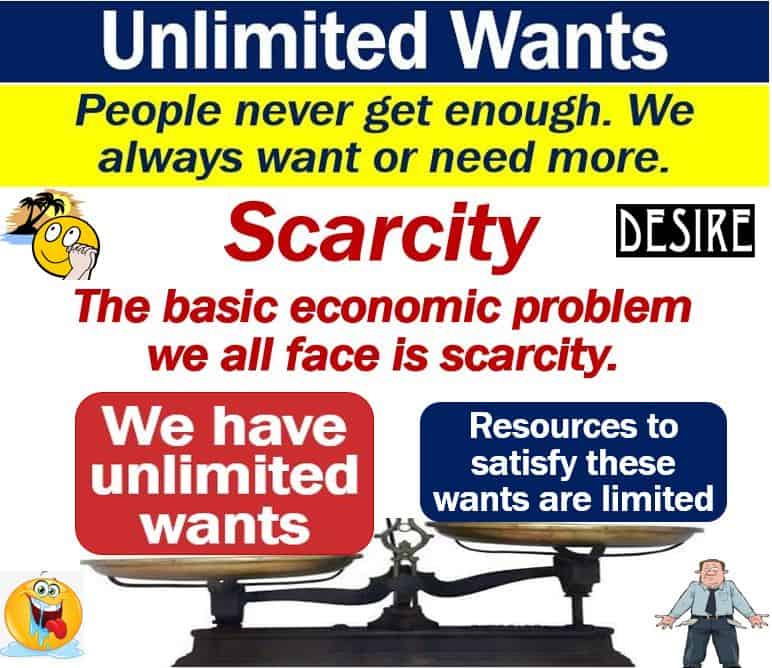What are unlimited wants? Definition and examples
Unlimited wants is an economic term that refers to humans’ insatiable appetite for things. We never get enough because there is always something else that we need or want. The term ‘unlimited wants’ is the side of human nature that wants an infinite number of things. However, the resources we have available to get these wants are limited.
There are two halves of scarcity that have plagued us ever since we first set foot on this Earth:
- Limited resources.
- Unlimited wants.
The Economics of Seinfeld says the following regarding the term:
“Unlimited wants essentially mean that people never get enough, that there is always something else that they would like to have.”
“When combined with limited resources, unlimited wants result in the fundamental problem of scarcity.”

Unlimited wants – limited resources
What we want and need has no limit, i.e., it is infinite. However, what we can afford is finite, i.e., it has a limit. This is a basic condition of human existence.
We are never completely satisfied with everything we consume. We consume a variety of goods and services, but they are never enough.
In other words, there is always something else that I, you, or anybody else would want or need.
The term applies to all socioeconomic groups. Low-income groups have limited resources, and their wants always exceed those resources. However, the same happens with middle-income and upper-income groups. They never feel they have enough.
The reason is a very simple one. Every income group’s resources are finite. However, unlimited want is a feature of every human.
Put simply; our wants and needs are infinite, but our wealth is not.
The economic problem – unlimited wants
‘The economic problem‘ is a term that economists use. It states that the finite resources of an economy are not enough to satisfy all our wants and needs. We also call it ‘the central economic problem‘ or ‘the basic economic problem.’
The main question we ask when considering ‘the economic problem’ is: “How do we satisfy unlimited wants with limited resources?”
As we cannot produce everything, we have to prioritize. We must decide what to produce, how to produce it, and how much to produce. We must also determine for whom to produce.
Human wants are constant and infinite, but the resources to satisfy them are finite. The resources cannot exceed the amount of human and natural resources available.
We produce things that we know people want, as long as we have the resources to make them. How strong or weak demand is determines how much we charge for those things. It also determines how much we produce (supply).
In other words, markets fores, i.e., the forces of supply and demand, in a free market economy, determine prices.
Wants vs. needs
Needs are things without which we cannot survive. Wants are things we desire. However, we can survive without those wants.
Food, water, and housing, for example, are needs. Clothing is also a need. Without food or water, we would die. We would probably die too without housing. In cold countries, we would not survive without clothing.
A nice car, smartphone, and vacation by the beach are wants. If I don’t have a nice car, I will still live. If I don’t go to Cancun for my winter break, I won’t die. However, I want these things.
Fundamental needs are key in the function of the economy. Wants, however, are the driving forces that stimulate demand for things, i.e., demand for goods and services.
We can say either ‘unlimited wants’ or ‘unlimited wants and needs.’

